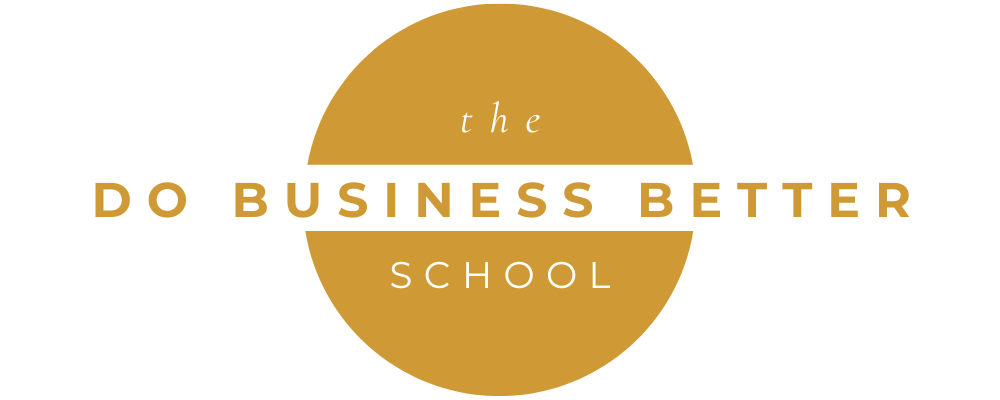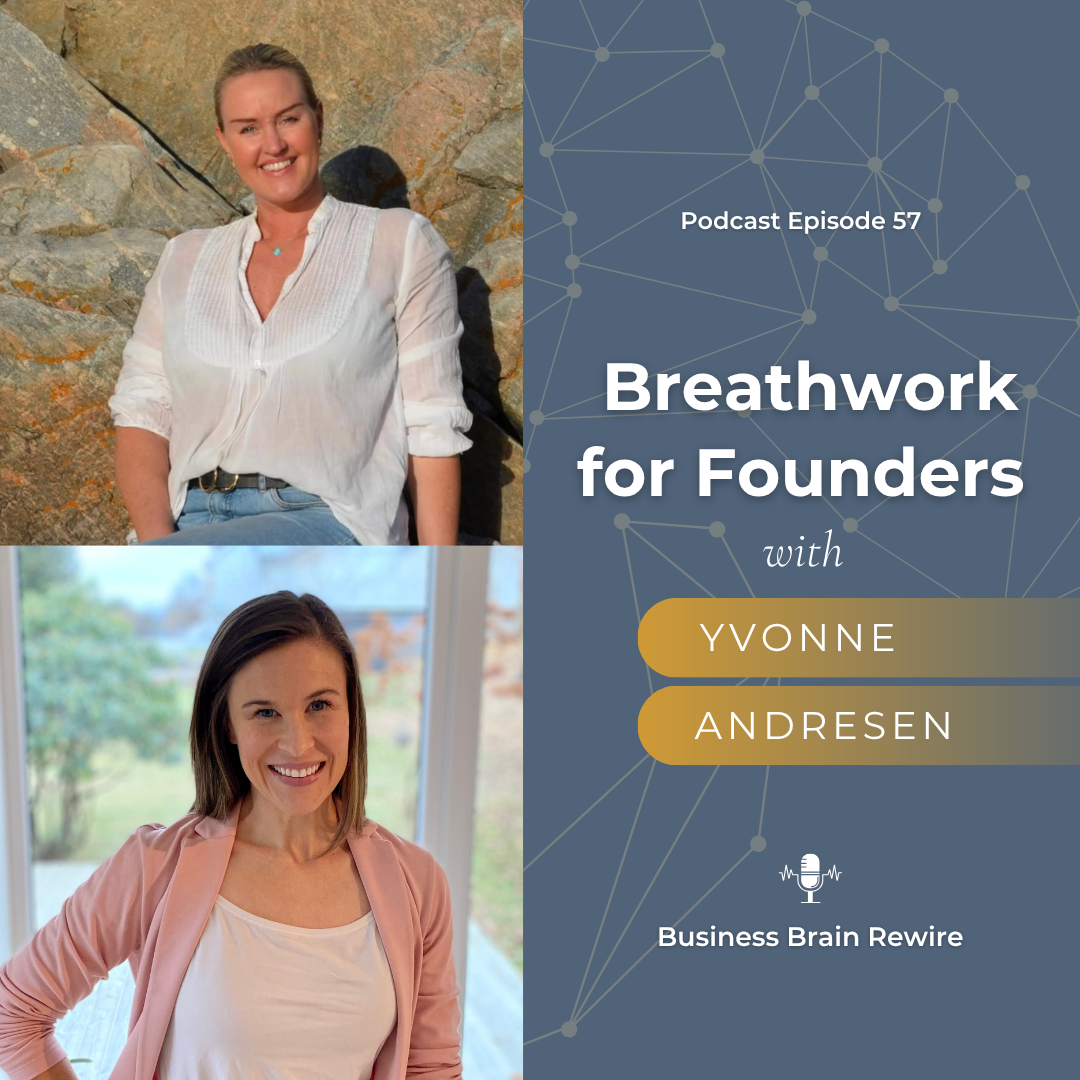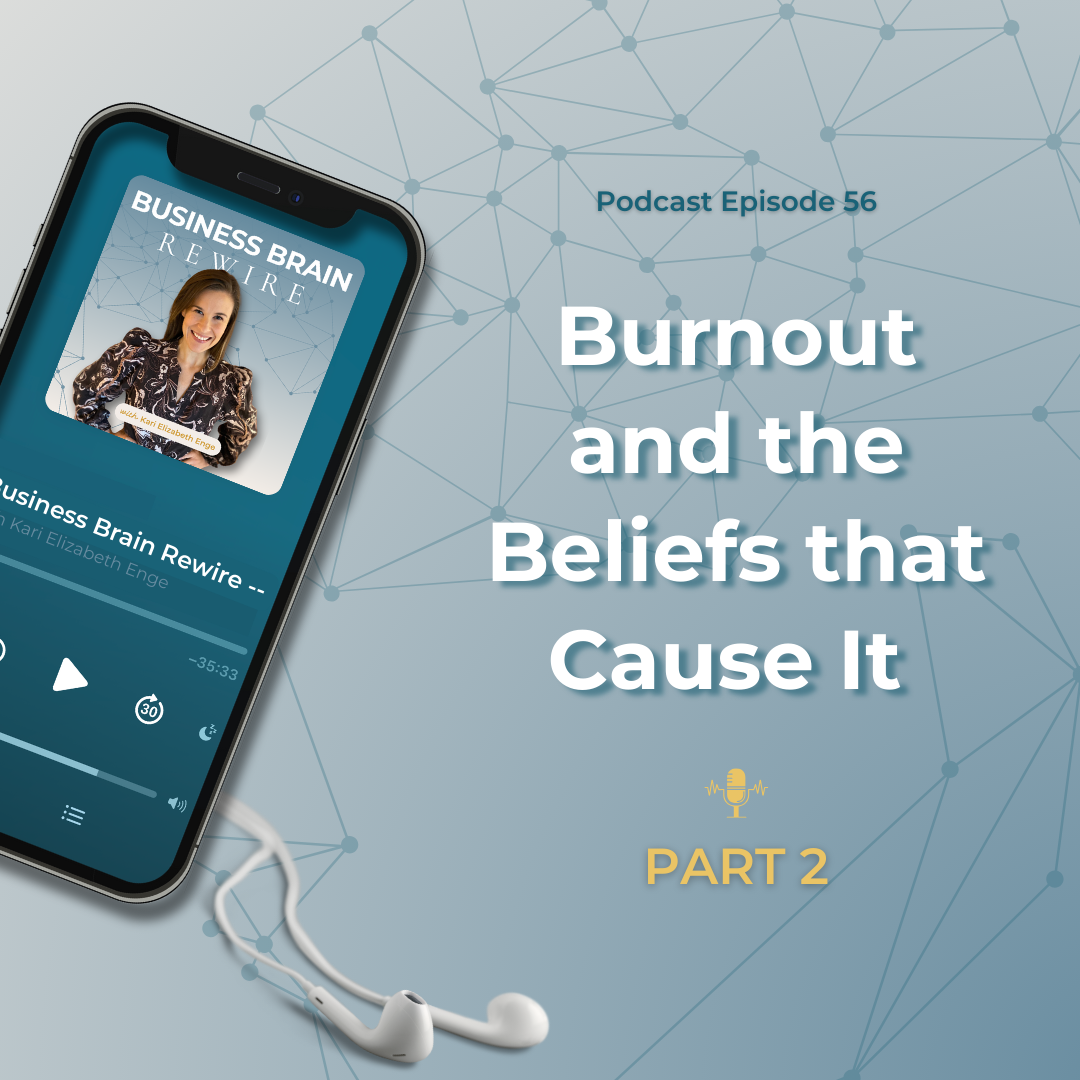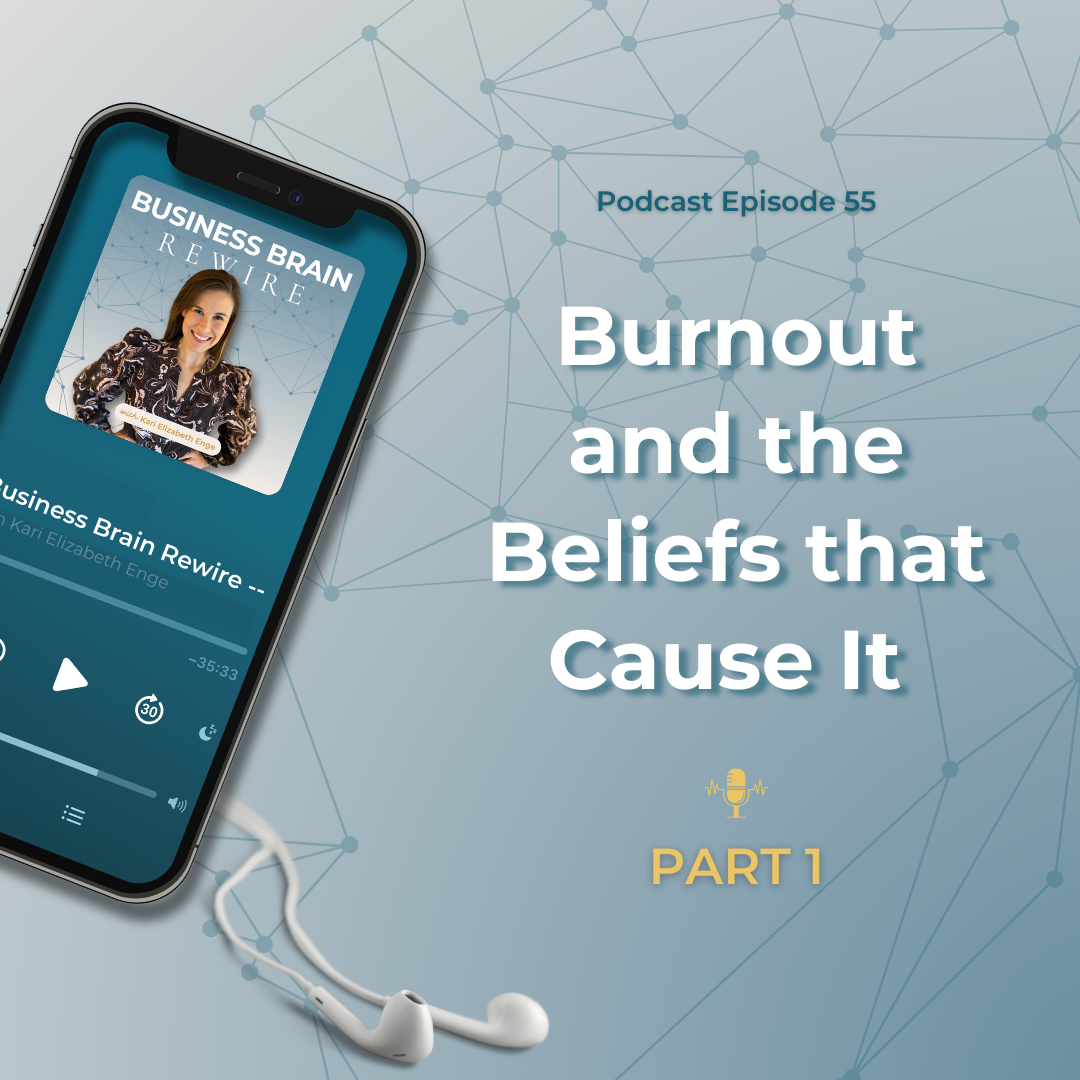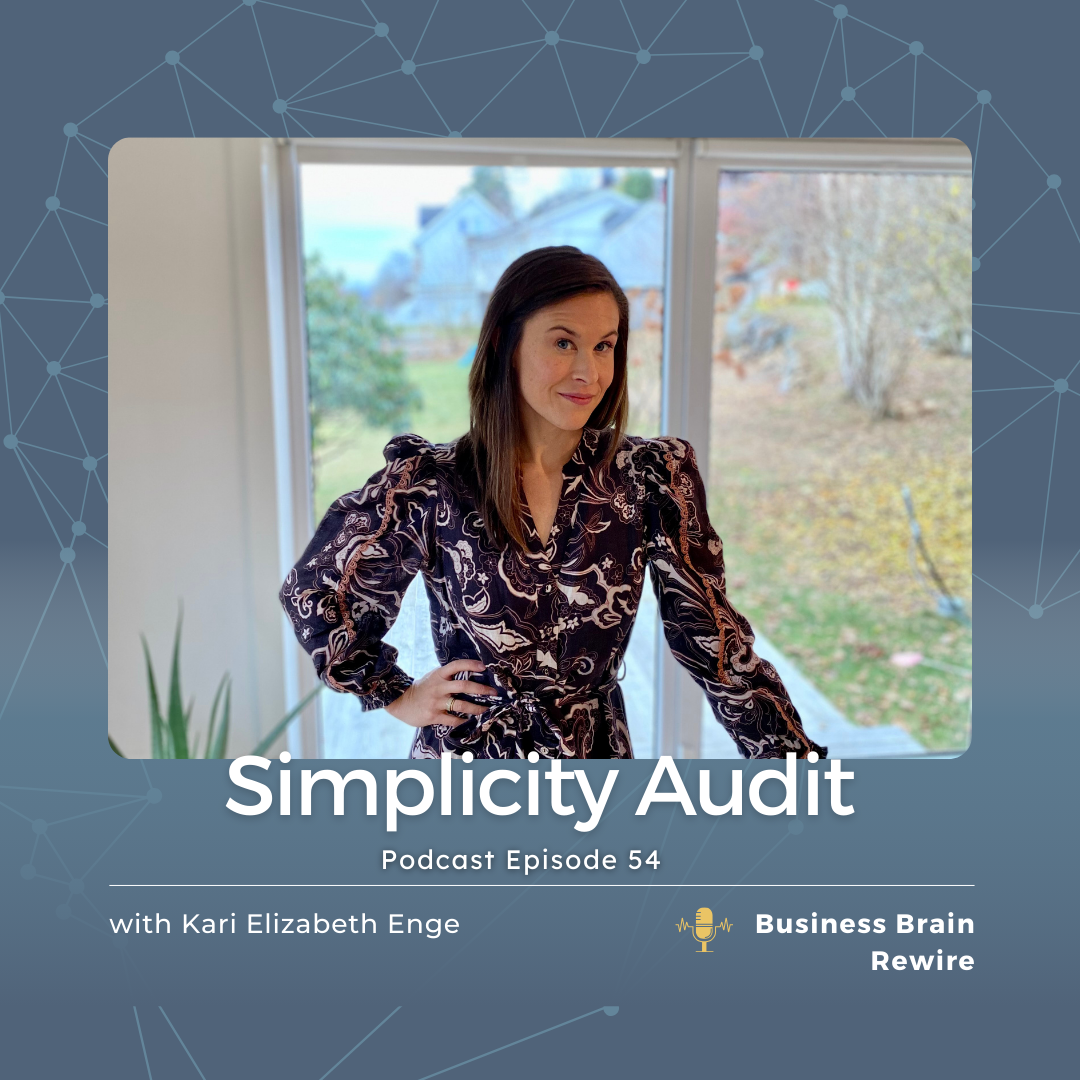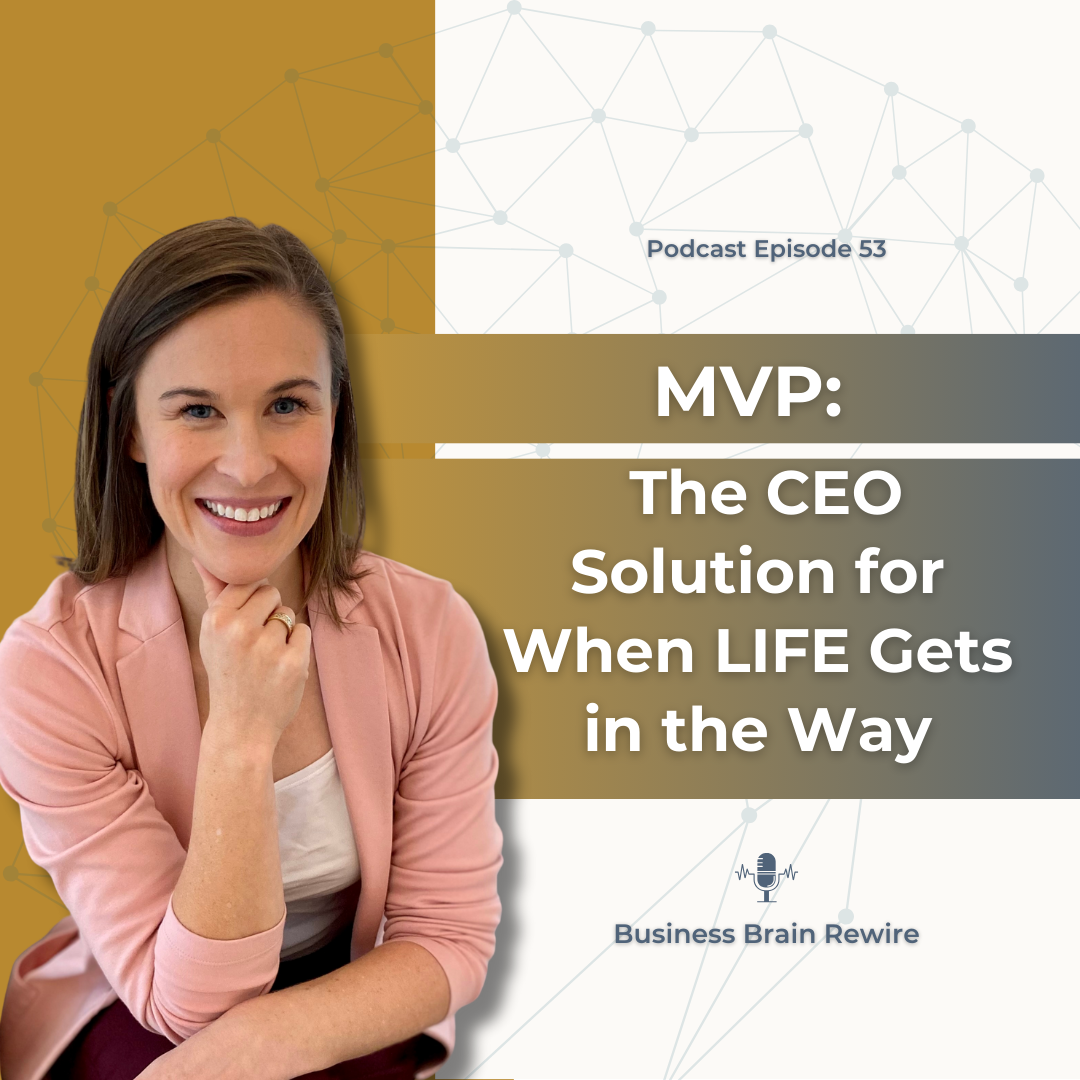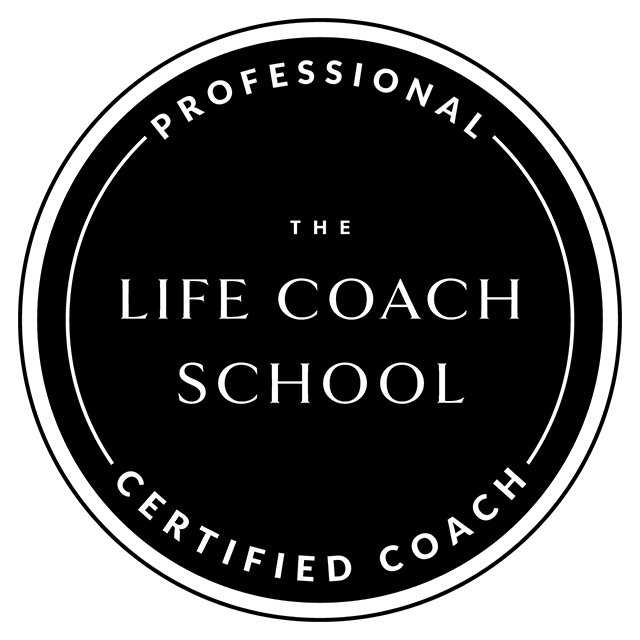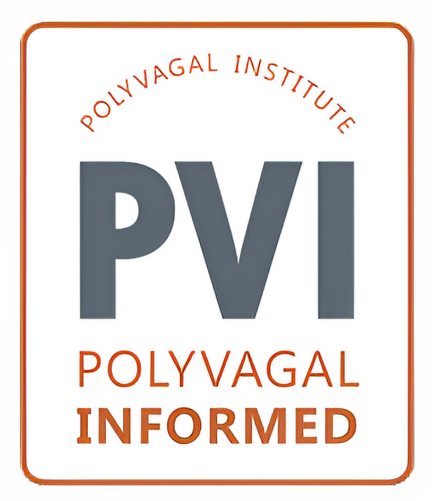What if the thing holding you back in business wasn’t strategy or mindset – but your breath?
In this episode, I’m joined by Yvonne, founder of Pust i Fokus and certified breathwork facilitator and mental coach based in Norway. Together, we explore how your nervous system influences how you think, lead, and create – and why nervous system regulation might be the missing piece in your business growth.
Yvonne and I have worked together for years (she’s a former coaching client turned friend), and what she shares in this conversation is practical, powerful, and deeply personal. Through her own experience with burnout and chronic stress, Yvonne discovered how breathwork could heal her body, regulate her nervous system, and help her reconnect with herself and now she helps others do the same.
This episode isn’t about adding more to your to-do list. It’s about slowing down enough to notice the signals your body is giving you, and using breath as a tool to reset, regulate, and lead from a place of clarity.
If you’ve ever felt overwhelmed, stuck in your head, or unsure how to slow down without losing momentum – this episode is your invitation to return to your body and your breath.
In this episode, you’ll learn:
- What dysfunctional breathing looks like and how to recognize it in yourself
- Why nervous system dysregulation blocks clarity, confidence, and growth
- How the vagus nerve impacts your leadership (and what to do about it)
- A gentle reframe: what if slowing down could actually move you forward?
Plus: We’re hosting a free breathwork workshop together! 🎉
Breath to Reset: A Breathwork workshop for busy minds + full lives is happening on Wednesday, November 19th at 8PM CET | 2PM EST.
You’ll get to experience these tools in real time. Find more information about the free session here.
If you’re already ready to join us, add this google meets link to your busy calendar – so that you don’t forget.✨
Transcript
[00:00:51] Thank you so much.
[00:00:53] I have been, well, actually, we’ve been planning this conversation for six months. I don’t even know. But, who’s listening. Yvonne and I know each other. We’ve worked together. I was Yvonne’s business coach for several years helping her to reimagine her business, redefine her business and to step into her business in a bigger way. I am so excited for all of you to meet her today. I invited Yvonne onto the show because she is passionate and very, very well versed in breath work. She works with clients as a breath work instructor and coach full-time. She has just so much knowledge for all of the founders who listen to this show. I’m excited today to learn from you because, you know, we normally chit chat either in a business context or in a motherhood context or a friend context. And I don’t actually know all of the breath work wisdom that you hold. So I’m gonna basically pick your brain today and be the student. But before we dive in, i’ll bet you tell everyone who you are and how you got into breath work and mental training.
[00:02:10] Absolutely. Thank you so much Kari, and it’s been a pleasure to working with you and yeah, we’ve known each other for a long time. It’s been a huge new experience for me as well to worked with you, but also the new transformation of my company. It’s really good that we can bring our knowledge and sharing, all these beautiful things for people around us. It’s really important now, I think.
[00:02:36] So, my journey into breathwork and mental coaching began through my own experience of burnout and chronic stress. So, like many others, I was well function on the outside, I was high function, very driven, and achieving. But inside, my nervous system has and was completely dysregulated.
[00:02:59] Eventually I hit the wall like many of us do, and I had to find a new way of living. I felt that I came home, where I’ve always been. That’s when I became to explore the nervous system, the somatic practices, and even the breath work. And that has truly changed my life.
[00:03:18] So, I trained as both as a breathwork facilitator and a certified mental coach. I’ve now run for eight years. I’ve been running my own practice here in Rabak in a way and I work with the clients in different ways, but many of my people I work with struggle with dizziness, anxiety, or this sense of overwhelm, which I deeply related to. Because in my process I got the living with the dizziness. I have a crystal disease, which I live with daily, and that’s a huge challenge for me. I’ve had it for over five years. So this is both like a professional part for me, but it’s also very personal. So today I guide others in how to regulatory inner state, build a nervous system, resilience and come back to the sense of safetyness. And I say one breath at a time. Yeah.
[00:04:16] Okay, so I have a couple of follow up questions. First of all, people are probably wondering what the heck pu focus means. Because you are Norwegian. We are recording this in Norway. We actually live in the same town, everyone, which I had no idea when I met you at a conference in Oslo. And then we started working together and then we realized we live like five minutes away from one another.
[00:04:40] Yeah. It was so cool when we met in Zoom.
[00:04:42] It was really fun. So I want you to tell everyone what that means. Just to give everybody a little bit of context.
[00:04:53] Well, Pust i Fokus is very personal for me. Of course, like I mentioned, it’s been a journey for me. I’ve been working with the digital communication for 25 years in a marketing perspective. So I’ve been having like a product manager hat on me like my whole life. I’ve been working with the huge like project both in Norway and in Denmark where I’m educated. But then I sort of did this rescheduling of my own capacity, my lifestyle. Yeah, this game changer where I got sick and then I totally changed it. I started built up Pust i Fokus. So Pust i Fokus for me is very personal because the journey I’ve like learned a lot.
[00:05:38] When I started doing the breath work part, I find out my body and how my nervous system could be regulated and my brain and all this wiring mechanism, mechanism that you do have when you get into this breathwork part. I started believing myself. I started to really find the true meaning of, yeah, this is home, this is where, where I wanna be.
[00:06:04] So actually, I just cleaned the upper part of my garage and I started to build a concept. What is supposed to focus. The name came to me. I worked with closely with friends and family around me to just gather information on how, and, you know. I’ve have a, a lot of good friends and family in Denmark as well. They are also like doing a lot of different kind of concepts when they’re doing treatment for people. And I sort of put together a concept that was doing both coaching, I have like a lot of visual tools that I use when I practice it with people. And then I use the bench where I actually open up the energies in your body and I start to do the breath work with the diaphragm. We get this diaphragm smooth and calm again.
[00:06:54] I use all these kind of different tools. It’s a really holistic and whole sustainable way of dealing with your health. I also look at your inner body, how your energy is, how your food and the training part, like small practices here and there. This helps you off the track. So Pust i Fokus for me is, sustainable lifestyle .
[00:07:18] I’m sure everyone’s like, what do you really mean? There’s so many components that go into it, so let’s dive in. I think that it’s helpful for everyone to maybe to start with a definition or at least you would explain what breath work actually is. People probably have seen breathing exercises and people talking about dysregulation or nervous system on, you or whatever, but a lot don’t actually understand, so what is breath work?
[00:07:49] Breath work is where you actually come home to your own functional breathing. We are born with the right breath. I say and we are breathing 20,000 times a day. Thinking about that. Amazing. For me, breath work is like coming back to your functional breathing. In the other hand, I’m talking about that slow, deep and the rhythm in using the diaphragm. So it supports the proper oxygen delivery, and it calms down the nervous system.
[00:08:26] Many people don’t realize that they, when they go into a mode of dysfunctional breathing, they often have this mouth breathing and it goes too fast and it’s too shallow. That reinforce the stress actually, the fatigue or even the dizziness in your body. So, I teach people to breathe functionally. In one of the first step I take in my session is by changing the tone, the rhythm, everything about how your breath actually is. You get into this functional breathing, the rhythm is slow and it gets supported, and this is where the balance gets in place.
[00:09:11] Because now you are welcoming the nervous system into the right place. You are welcoming the hormones, the u immune system to a healthier way in general. So when you get back to yourself, like I say, you get into place and your healing space and all this in functional breathing.
[00:09:33] Okay. So, how does someone know if they have dysfunctional breathing? Are there some common symptoms, issues that arise where someone could say, okay, I have like maybe a couple of these, so maybe I have dysfunctional breathing.
[00:09:48] Yeah. You know what? We all have dysfunctional breathings. Isn’t that just like a wow thing. Because when we are changing in environmental or we are having episodes in our life when we are dealing with childhood where we have not maybe been met or seen in the feeling and the consciousness area. We have a lot of trauma built in our lifestyle, maybe for many of us. And so, there we built up this mechanical breathing as I’m talking about, which is this system dysfunctional breathing. You can notice your breathing by actually slowing down.
[00:10:29] It’s all about taking back the control of your attention actually. Because the attention is right now the most precious thing that we are handling with that every one of us are dealing with our attention is getting stole away and dragged away from here and there, and it stresses us. So if you not like having this cautiousness over it and taking back the control. I’m not meaning the control, control wise, like we are talking about the control. Because that’s also something that is very important. It’s not that you’re gonna force your breathing to be functional or in any kind of way. It’s more like you have to experience it. You have to be taught how to actually get back to your own functional breathing.
[00:11:18] It’s about being kind to yourself. It’s about opening up for your senses. It’s about bringing you back to the nature, to the motherhood, to everything that’s been grounded for you. It’s been lying in front of you the whole time, but you have not noticed it and you haven’t been putting your effort into it. So that’s more like the , the way of the functional breathing.
[00:11:45] I love how you said it’s not something you force. It’s just like something that’s there. You just have to access it.
[00:11:49] Yeah, yeah,
[00:11:50] If someone is struggling with dysfunctional breathing, let’s just use maybe a female founder as an example. She’s stressed out and she’s got like tons to do for her business, and she has this dysfunctional breathing, dysregulating her nervous system. What kind of issues or challenges might come from that? Like, like like issues that happen because of the dysfunctional breathing in the nervous system.
[00:12:17] Oh, this is also a very good question and and I love it and it seems the funny thing is that it’s so simple. Right. We are born with this breath. We are like living with this breath. So we have it and we hold it through the whole day. But what I often see on founders and everybody else as well, is that we live or we tend to live in the constant on mode.
[00:12:45] Right. We hold a lot of responsibility here and there, and we are juggling a thousands decision through the day. And naturally it affects our breathing, right? Because all of the situations we are, hold through the whole day affects our breathing. So many of the of us, developed this shallow fast breathing, this upper chest breathing that’s up here. It keeps the nervous system in a state of alertness. Like, ooh, ooh, ooh, I gotta be, you know, this fight flight mode that we know a lot about. And then this gets bigger and bigger. Then we started to this dysregulated thing where we are have walking around with breath holding. A lot of us do that many times through the, through the day. We do not have focus on this deep, deep, deep stimulating of the nerve.
[00:13:40] Another thing is that today we have a lot of yeah, we are going through so many things like reading emails a lot today. The focus needs to be deep. Dealing with all these stressful issues or these tasks that fill our everyday life, we need to get down again so that we can feel our body. We need to bring the awareness, which I say back to the breath. It’s like doing breath work before the meeting, before we sleep, before we are having this important issue on us or something we need to take into account.
[00:14:18] So it’s important to slow down and really noticed about how is your breath doing right now? Then you are reconnected and then you can feel this powerful because the breath is so powerful Kari. It’s such a great tool because when you start to breathe and it’s only about small seconds. It’s not like putting the whole day off for breathing or you have to go there or there. No. It’s a tool that you carry in here. You have it inside of you the whole time. And then when you get this tool in place, you can feel the clarity, the calmness you get to be that better leadership that you always wanted to be. It doesn’t always work from the bottom and down here, but it’s the shift of from here and up here.
[00:15:11] Right. For everyone listening, you can’t see Yvonne, it doesn’t happen from cognitively changing your thoughts that is what de-stresses you. It’s getting into this functional breathing and it sends the signal back up to the brain. Can you talk a little bit about the vagus nerve? What is it? Why is it important? Because I think you’ve touched on it here, but I think everyone would love some more clarification about how it works actually.
[00:15:33] Oh, thank you. I love to talk about the vagus nerve. And I could do that for like maybe four hours or 10. But it’s so cool because the vagus nerve is like the most important and yet overlooked nerves that we have in our body. It runs through the brain and through the face, down to the heart, into the lungs, and into the digestive organs.
[00:16:01] This vagus nerve is the key player in our parasympathetic nervous system. What does that mean? This nerve is actually responsible for the rest and digest state in our body. So when we get in contact with this, the healing, the feeling safeness, all these very important things that we do have in our body starts to go into the right tone.
[00:16:30] So in my work, we use specific breathing techniques like vocal toning, humming, mm mm, and movement directly to stimulate the virga vagus system. We call it like you say, vagus reset. It’s a tool that you can use and it’s in our body and it’s speaking directly to our organs, all of them.
[00:16:57] This is just a fantastic. Nerve. If anybody, if you haven’t heard of it yet, please Google it and go in and check it out what it actually does to you. When this vagus nerve gets stimulated and you go into this parasympathetic mode, which you do, then your immune system, your hormones and your nervous systems gets to be regulated and gets into this balancing mode, which is such a fantastic way of living a healthy lifestyle.
[00:17:31] I think we probably could talk about it all day. A couple of things that I learned that were big aha moments for me, that I think it’s helpful for founders to know. One of them was the fact that 80% of the receptors run from body up to brain and not brain down to body, which means that in order to regulate your nervous system, you can’t do it with thought work. You can’t do it with mindset. So you have to learn how to use your body to talk to it basically. Which is what the breath does. That’s why it’s really, really important for founders to not just stay in their head all day. We’ve got to blend these tools into the workday.
[00:18:13] The other thing that I remember learning was that your thoughts change and your emotions change based on what nervous system state you’re in. Meaning like what branch of the vagus nerve is activated, which part of it is on. That changes everything because as a business coach for me, sometimes a founder will bring you a problem and they’ll wanna solve it by talking to someone and thinking about it.
[00:18:46] When they are regulated, they have completely different thoughts about it. So sometimes the answer is not thinking more, strategizing, more, talking, more doing something. It’s like maybe we just need to take some breaths and your brain will problem solve this in a quicker way, calmer way, more simple way. It’s just so important that we understand our nervous system and, and how the, like the biology of it works.
[00:19:16] I think this is something that I really, really have a, a huge passion about because, and it’s also very talked about, I think because for me, breathwork is not only the spiritual practice because people think that breathwork is that. And yeah, it’s been going on for over 3000 years, breathwork in the eastern part. But it may be in our country, like in Norway, it has not the last 20 years because the science are saying, yeah, go ahead. And the thumbs up that I’m showing. But for many, it’s like reconnecting to our intuition, reconnecting to our inner peace and actually our purpose. Because we are constantly holding everything together and breath work actually offers a way of letting go, right?
[00:20:07] That is so scary, right? You go like, oh my God, am I gonna let go? No, it’s not like letting go, letting go. It’s like actually be those values that you are, do those values that you are, because we are human beings. We are not human doings. Right? That’s a friend of mine that taught me that, and I find that very, very nice. I think that’s a huge way of not constantly going into this autopilot mode, which a lot of us and I’ve been there. Believe me, I’ve been there and I know how that felt and it was terrible. So when I came back to being, I was doing more right things.
[00:20:56] Yeah, I think that’s the beautiful part. It’s like when you slow down and you understand what it feels like to be in a regulated state. It’s not like like you get more lazy or slower.
[00:21:08] Not at all.
[00:21:10] It doesn’t feel as dramatic. It feels joyful, and you find yourself doing more, but it doesn’t feel like it did before. So, it’s really fun when you can experience it, like you said. What I love just to kind of circle back is we were talking about how it changes your thoughts. I think maybe you sharing an example. I know this was not planned, so if you can’t think of anything we can come back to it. But if you can think of an example of where someone maybe came into a session and they were really worked up about something. A particular thing happening in their life that it felt really maybe complicated, complex, and scary, and then you had your breathwork session and then they saw it differently. Do you have any particular example that you could share? Because, because I think it will help founders, especially give themselves permission to slow down, to use some breath work practices during the day if they know that it will help them to problem solve, for example.
[00:22:18] Yeah. Oh, I have a lot of examples actually. But what I see is that people are not like, present in their body like they are, like you say, they are in their head. So when they often come to me, they are talking so much or they’re talking so little, but I can feel and I can sense that they’re only in their thoughts. When I do this, I do what I call a physical, emotional, and mental shift with them, and I start to make them just slowly breathe. Like inhale, exhale. I just start to do the slow breathing with them. And then I noticed that they will notice themself.
[00:23:09] This is something is really hard to explain. I think that you need to like really experience it yourself, but it’s taking back, you know, the breath, it’s both automatically and voluntary. Like it gives you the uniqueness of this checking in with your nervous system.
[00:23:28] And when you are constantly in your head, no matter what you are doing, we are constantly in a hard thoughts, right? We have over 70,000 thoughts a day. Yeah. We take 35,000 choices made of those thoughts in here, but those thoughts are running through our system the whole day in a do mode. So when we slow down, we are actually releasing the cortisol, which is the stress hormone in our body. Then it goes like a loop in your body. We are actually forcing the thoughts to be quiet and you are forced to be here now in your own consciousness, your real state of mind. This is actually very general, so this is how it works with a lot of people. So when I tell them to slow down, to speak slower, to do one thing at a time, because we are cheering in the, you know oh my God.
[00:24:31] I remember myself when I was working as a project manager and handling like thousands of different projects in my company. I was like, oh, I’m such a great multitasker and I’m just doing this and this, and blah, blah, blah, blah, blah.
[00:24:44] Oh my God, I was so tired of myself saying that. And I didn’t know. I didn’t know why was I so tired about bragging about me being a multitasker, which is no good anyhow, because it meant that I did like 20% of all my tasks. Right? So look at those questions. Think about all these kind of things. How can you be more present in the work you’re doing, in the tasks you are dealing with all this starts with this consciousness in the contact with your breathing, and then you move and shift your energy and then the whole body starts to work with you. Yeah. It’s long answer, but I hope it makes sense.
[00:25:28] Yeah. I think really great that you’re saying is that you have to experience it and then once you experience it, then you get it. That was my journey as well. When I first started working with a nervous system coach , maybe I’ve said this on the podcast before but I don’t know if I’ve told you this. When I first started working with her, I hired her because she was in a mastermind with me and she was chatting about how she helps people to overcome childhood trauma so they can live joyfully again. I was like, oh, great. You’d be great for my mom.
[00:26:02] So I interviewed to her trying to like, you know fix my mother you know, we’re chitchatting and you know, I’m talking a little bit about my childhood and, and my mother. Of course my mom was looking for a coach, so I wasn’t soliciting, you know, this on her or anything. But she’s like, you know, you might benefit this. Just kind of really open and not, and not in a pressy way. I was like, okay and then I started talking about my clients because she was mentioning a lot of symptoms that my clients were showing up with. So I was like really curious like, what do you mean this could be nervous system stuff? That’s like shutting my clients down because their bodies don’t feel safe when they’re going out there to build their businesses.
[00:26:45] I was super curious about that. Then I was like, well, maybe, maybe my clients need you. Maybe I could refer my clients to you. Then she’s just like, you know me and it could also be helpful for you. Just bringing me back there. So I really challenged myself. You know what? I do think you might be good for my mom. I do think you might be good for my clients, but I will go first.
[00:27:04] I hired her and I started working with her, and I spent like three months arguing with her. Because I was not letting myself soften and experience the shift from dysregulation to regulation. And not really believing that I was actually dysregulated.
[00:27:20] But I kept showing up to the sessions and she kept on doing the breathing and the somatic movement with me. There was one session where like my body finally like, let me relax. I was like, oh. I am dysregulated because what I will say that I noticed is that my body took a big, involuntary inhale and ex exhale, like a sigh. I was like, Ugh. I noticed that it did, that I was yawning over and over and over again. So I also noticed that like why is I’m like yawning all the time and then. I just felt so grounded, so slow, and also tears just started pouring out of my eyes . Now you, now you’ve got my attention. That was a long explanation, but I think it’s really important for people to not like intellectualize what we’re saying and just kind of get curious and experience it. Because once you feel the difference between dysregulation and regulation, then I think you’re kind of hooked because you know what’s available to you.
[00:28:26] Absolutely. I think that you actually explained it better than me. So that’s fantastic. I think that it all happens in a very personal way. For you it came out like that. But moving into the breathwork itself, it’s either you are sitting or you can be lying down. It’s all these kind of different techniques that we, that we can use, right?
[00:28:50] When we do experience it in our body, that’s where actually the game changes. Like you’re saying, that you feel safer. If there’s one thing that we people need to feel more of, it’s being safe. It’s very important to us to feel safe, but it’s very important to feel safe in our own body. Right?
[00:29:10] So, instead of listening outside and get the validation from everybody outside, start asking yourself the right questions. Right? What do I need? What feeling are true to me? Right? It’s all this. That’s why the brain part and the heart part is so great to combine those things together, right? I am talking about, when I say it, it’s more like bringing the elevator from your head down to your heart, but it’s actually also bringing the elevator up again from your heart and up to your brain.
[00:29:45] But then the elevator is kind of more empty, but it’s more like you bring this elevator up here, right down to your heart, and it’s checking in with other wiring principles, right?
[00:29:57] Because we know that if we train our minds to do things that we do like, that we joy, that we can feel satisfaction for, and that checks it in with our positive and regulated nervous system. We know that we get happier. We know that we get more energy. We know that we get more love. We know that we can bring this joy, this real joy been living in with, need us inside of us the whole time. This child that’s in us, right? We forget to be childish. We forget to be curious. All these things are getting back to you when you do connect with your heart and the only tool. You can use to check in because of the vagus nerve and because of this fantastic tool and this muscle that you have down here, which you call the dia rag, which is the part of the skeleton in your body, you can have this, you can experience this.
[00:30:54] You need to slow down, right? You need to take one breath at a time. I keep saying in because I’ve been so active in the communication part, right? I say that if the breathing should be the first word when you talk to somebody. Then the talk would be so differently because if I breathe in. Hold two. Then I breathe out again. I go like, Hey, that’s a good question. I can get back to you. I don’t need to answer that question right away. I can maybe be still for a moment and just checking in. What do I really feel about this question? Right. If I have an argument with somebody, with my husband, with my kids, you know, whatever, you have your business partner, right? Your everyday life. It’s all about checking in with yourself. We are trained to do and answer like this, but it’s time to actually bring that back to so that you can own it in your own way. Right? Yeah.
[00:32:07] Yeah, I think what I’m like, what’s coming up to mind for me right now is how powerful is this for parenting leadership, like it changes everything. To your business, to your relationships. It changes everything. So I know that everyone’s super curious, let’s talk about the fantastic idea that we’ve had and what we’re gonna do. About the workshop that we’re gonna put on for them when it’s happening, and what you’re gonna teach everybody.
[00:32:37] Oh, I am looking so forward to it. We have called it the Breath to Reset actually, and it’s a breath work workshop for both the mind and for everybody that have busy minds, the full lives. For everyone that wants to join us. What we are gonna do is that we are going, I’m gonna give you, we are gonna give you like the one hour guided session where you get to experience the effect in real time.
[00:33:03] It’s not like thinking about it. It’s actually doing and be presenting. Whether you are a parent, as you say. If you are a business owner or you are looking for more balance in your life. This is the space for you. We are gonna hold you. We’re gonna support you through the whole session, and you’re gonna get a new tool where brings you back to life and which you can use in your everyday life.
[00:33:29] Afterwards, and I’ve called it the here and now mantra. Where we actually say, I’m here now with my love and presentness to myself. Then we are gonna breathe it in so that actually it’s gonna do this body mind loop where you can make your thoughts go quieter and your heart go stronger. Yeah. It’s online and it’s free. It’s a link in this episode and a more description and if you have any questions, you can write to me, right? Yeah.
[00:34:03] of course. I have been wanting to introduce all of you to Yvonne for about a year, maybe longer. I so excited because I have never actually been guided through. Breath work with her. So I will be, of course, hosting it and introducing Yvonne. But I’m gonna be a student and a participant in this workshop as well. So I really hope that you join both of us. This is just a gift for both of our communities, and we wanted to do this for you guys so that you could have these tools. So it is happening on November 19th, 8:00 PM Central European time. So that is 2:00 PM Eastern Standard Time in the States, and we’ll link to it in the show notes. Thank you Yvonne, for chatting. I think we could continue on for hours and I’m sure we’ll chit chat again when we have coffee together in a few weeks. But thank you so much for sharing your wisdom with everybody today.
[00:35:02] Thank you so much for being present. Thank you.
[00:35:05] For everyone who is interested in your particular practice, Pust i Fokus and wants to learn more about your philosophy, get to know you better, where can they find you?
[00:35:17] I’m mostly active on Instagram. It’s a Pust i Fokus and Facebook where I daily spread like good knowledge and tips about the burg’s nerve and receiving the brain and heart through the breathwork part. Yeah, all this. I also have my own website, Pust i Fokus.no.
[00:35:34] That’s great. I would also say, because we know each other, that your website does a great job of explaining some of the particular symptoms that breathwork can help with. We didn’t really get into that today, but if you’re struggling with Crystal’s disease, what we call vertigo in the states or anxiety or any of these other symptoms, it’s great to go to Yvonne’s website, check out what she could help you with specifically, or just send her a message to say: Hey, could breath work, help with this? And you guys can get connected there. So again, thank you so much Yvonne, and I will see you soon for a coffee.
Podcast: Play in new window | Download
